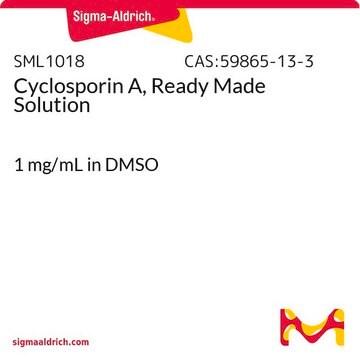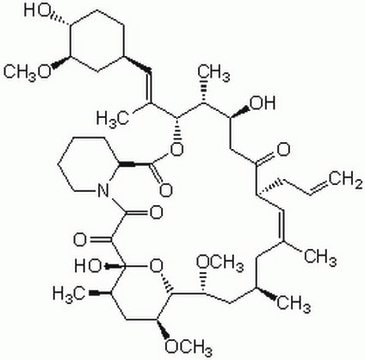C1832
Cyclosporin A
BioReagent, from Tolypocladium inflatum, for molecular biology, ≥95%
Synonym(s):
Antibiotic S 7481F1, Cyclosporine
About This Item
Recommended Products
biological source
Tolypocladium inflatum
Quality Level
grade
for molecular biology
product line
BioReagent
Assay
≥95%
form
powder
technique(s)
drug transporter assay: suitable
solubility
dichloromethane: 9.80-10.20 mg/mL, clear, colorless to faintly yellow
suitability
corresponds to standard
suitable for molecular biology
antibiotic activity spectrum
fungi
Mode of action
enzyme | inhibits
storage temp.
2-8°C
SMILES string
CC[C@@H]1NC(=O)[C@H]([C@H](O)[C@H](C)C\C=C\C)N(C)C(=O)[C@H](C(C)C)N(C)C(=O)[C@H](CC(C)C)N(C)C(=O)[C@H](CC(C)C)N(C)C(=O)[C@@H](C)NC(=O)[C@H](C)NC(=O)[C@H](CC(C)C)N(C)C(=O)[C@@H](NC(=O)[C@H](CC(C)C)N(C)C(=O)CN(C)C1=O)C(C)C
InChI
1S/C62H111N11O12/c1-25-27-28-40(15)52(75)51-56(79)65-43(26-2)58(81)67(18)33-48(74)68(19)44(29-34(3)4)55(78)66-49(38(11)12)61(84)69(20)45(30-35(5)6)54(77)63-41(16)53(76)64-42(17)57(80)70(21)46(31-36(7)8)59(82)71(22)47(32-37(9)10)60(83)72(23)50(39(13)14)62(85)73(51)24/h25,27,34-47,49-52,75H,26,28-33H2,1-24H3,(H,63,77)(H,64,76)(H,65,79)(H,66,78)/b27-25+/t40-,41+,42-,43+,44+,45+,46+,47+,49+,50+,51+,52-/m1/s1
InChI key
PMATZTZNYRCHOR-CGLBZJNRSA-N
Gene Information
human ... PPIA(5478)
Looking for similar products? Visit Product Comparison Guide
General description
Application
- Using in in vivo Neovascularization Assay, to subcutaneously inject the mice daily for suppressing the immune response.
- Measuring the multiple drug resistance transporter activity in putative cancer stem/progenitor cells.
- mRNA transcription studies
- analytical standard
Biochem/physiol Actions
Not finding the right product?
Try our Product Selector Tool.
Signal Word
Danger
Hazard Statements
Precautionary Statements
Hazard Classifications
Acute Tox. 4 Oral - Carc. 1B - Repr. 1B
Storage Class Code
6.1C - Combustible acute toxic Cat.3 / toxic compounds or compounds which causing chronic effects
WGK
WGK 3
Personal Protective Equipment
Choose from one of the most recent versions:
Certificates of Analysis (COA)
Don't see the Right Version?
If you require a particular version, you can look up a specific certificate by the Lot or Batch number.
Already Own This Product?
Find documentation for the products that you have recently purchased in the Document Library.
Customers Also Viewed
Our team of scientists has experience in all areas of research including Life Science, Material Science, Chemical Synthesis, Chromatography, Analytical and many others.
Contact Technical Service










